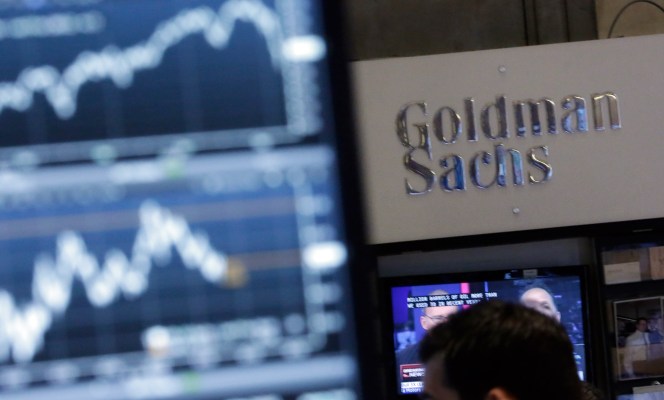Goldman Sachs is no stranger to testing the waters with crypto, with institutional clients looking for more exposure in the space.
Last week, Goldman was the first major U.S. bank to execute an over-the-counter crypto options trade with Galaxy Digital, which some market players say is foreshadowing more institutional adoption of digital assets.
“Crypto markets need large, credible and credit-worthy counterparties to grow the space further,” a source who works with digital assets at a major investment bank told TechCrunch. “Goldman and other Wall Street banks will bring that eventually.”
The 153-year-old firm is headquartered in New York City with offices globally and has $2.47 trillion assets under supervision. Galaxy Digital’s trading unit facilitated and executed the transaction with the investment bank in the form of a Bitcoin non-deliverable option.
This means that the firm isn’t directly engaging or holding the underlying crypto, but taking an option with a payoff that’s settled in cash, Tim Grant, head of Europe at Galaxy, explained to TechCrunch.
“The trade itself doesn’t mean much, but the fact that it happened and opens the ability for Goldman Sachs to trade this risk is massively significant, and this is just the beginning,” Grant said. “As soon as you get into that part, that set of hurdles, you’re intellectually and operationally free to do other things. It’s not the trade itself, it’s that this will allow us to go in a multitude of directions.”
Goldman did not provide additional information requested by TechCrunch before publication.
The firm is no stranger to crypto, or Bitcoin more specifically. It first set up a cryptocurrency trading desk in 2018, but shut it down for three years, only to restart it in early 2021. Since then, the bank dipped further into the crypto world by allowing investors to trade Bitcoin derivatives through block trades on CME Group in May 2021 and providing clients access to an ether fund through Galaxy Digital, among other offerings.
“I expect the [crypto] space to be a lot more institutionalized in the coming months [and] every investment bank will be involved in the space in the next year or so,” Kevin Kang, a founding principal at BKCoin Capital, said. “Crypto will become a part of any bank’s offerings and trade like another asset class.”
Market players may sometimes view crypto as a scam, but it’s similar to how derivatives were received when they launched back in the 1980s. Now, they’re one of the biggest money-makers out there, Kang said.
“I’ll expect the same theme to develop within crypto in the coming years,” he said.
But until government regulators provide clarity, Wall Street banks won’t actually be able to “touch” crypto and will have to keep using alternative options to gain exposure, the bank source said. This over-the-counter options trade allows Goldman to “work around” its inability to access the spot or physical Bitcoin market due to regulatory constraints.
“Some of the institutions waiting on the sideline have not stopped doing work in the space” but are waiting for regulatory clarity to jump in, Carlos Betancourt, founding principal at BKCoin Capital, said. “They’re very much getting educated and you’d be surprised by some of the names we’ve talked to recently that have spent the last year or two diving into the space but are just kind of sitting on the sidelines waiting.”
Overall, as large globally regulated institutions engage in regulated crypto trades, this can open the door to other crypto offerings and involvement in the crypto ecosystem. If markets continue to grow and clients continue to ask for this, other banks will also offer these types of trades, both the bank source and Grant said.
“Banks do what the clients ask for, and demand for crypto market access from clients remains high,” the bank source said.
Demand can be varied, but Coinbase’s institutional trading volume increased about 847% from $120 billion in 2020 to $1.136 trillion in 2021, according to its 2021 fourth-quarter earnings report.
The size of institutional involvement in crypto markets will continue to increase and so will its complexity, Grant said. Even though the timing isn’t set in stone for full-blown mass adoption due to regulatory red tape, it’s a “well-drawn path from here.”
